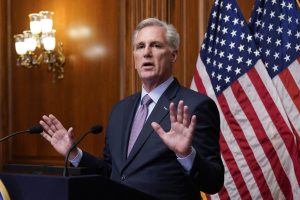The political drama in Washington has taken a fresh turn, with Representative Kevin McCarthy (R-CA) voted out as speaker of the House of Representatives this week.
Having just barely avoided a government shutdown earlier this week, the hope that Congress might resolve its disagreements in the 45 extra days made possible with the passage of the continuing resolution on Saturday seems to have dissipated.
The recent developments are a clear indication that polarization and partisanship are now mainstays of politics in Washington, outliving the divisiveness of the Trump administration. As McCarthy awaited judgment, former president Donald Trump found himself in a New York courtroom in a civil fraud trial involving $250 million for allegedly falsely inflating his net worth in order to enrich himself.
Representative Matt Gaetz (R-FL), who initiated McCarthy’s ouster, declared prior to the vote that there should not be a “secret side deal” between Biden and McCarthy and to support both Ukraine and border security with a resolution that “fails to give either of those issues the dignity they require.”
U.S. support to Ukraine since Russia’s invasion in February 2022 has amounted to $76.8 billion, an amount that includes security, financial, and humanitarian assistance.
Gaetz is part of an increasingly vocal group of hardline Republicans who have been calling for the cessation of aid to Ukraine, a country he has described as “a money laundering Mecca.”
Why Die for Taiwan?
The failure to agree on further funding of the government and support for Ukraine is a worrying sign not just for America’s European allies. It is also a sharp warning for partners in Asia.
Resolute support for Ukraine is based on the logic that if Russia is able to achieve victory, it would encourage China to pursue its irredentist goals toward Taiwan. While the current stalemate in Europe’s battlefield certainly strikes a note of caution for Beijing, the political discord in Washington indicates that America’s own house may not entirely be in order.
The success of Gaetz and his “MAGA” loyalists to oust McCarthy gives the small band outsized political clout as America enters election season. It should be noted that the Democrats all voted in favor of McCarthy’s removal, hoping to weaken the Republicans but consequently presenting a victory to GOP hardliners and their isolationist agenda.
Witnessing the successes of nativist rhetoric, the Republican Party might begin to adopt such views in formulating its foreign policy platform for the 2024 Presidential Election. The concern is what this might mean for Taiwan and the rest of America’s Asian allies.
According to a recent survey from the Pew Research Center, more Republicans than Democrats view China as a greater threat while the opposite is the case with regard to Russia. Despite a slight partisan convergence in perceptions of Russia right after the invasion of Ukraine, the rise in Ukraine-skeptic rhetoric within the Republican Party might be more of a historic symptom of seeking a more “constructive” relationship with Russia.
While the “tough on China, work with Russia” approach may describe the Trump administration, a revival of this policy is far from likely as U.S.-Russia relations continue to degrade. Whether or not Biden secures a second term, the next administration will continue to face pressures on two fronts.
Unlike Ukraine, however, Taiwan has stood for more than half a century in anticipation of an invasion from the mainland. Washington’s regional partners are also beginning to strengthen ties with Taiwan. In September this year, Japan appointed a de facto defense attaché to Taipei demonstrating its strategic interests to check perceived threats from China.
The U.S. has also authorized spending up to $2 billion annually in support of Taiwan from 2023 to 2027 through the Taiwan Enhanced Resilience Act, a resolution that has garnered bipartisan support. The manner in which China is perceived here in Washington as an existential “communist threat” may only entrench a cross-party consensus to maintain support of Taiwan.
American commitments in East Asia have also been strengthened this year. In August, Japan, South Korea, and the U.S. held a trilateral meeting at Camp David at which the U.S. reaffirmed Washington’s “ironclad” deterrence commitments to its treaty allies. Presiding over a hearing of the Senate Foreign Relations Committee regarding the security on the Korean Peninsula, Senator Christopher Van Hollen Jr. (D-MD) reminded everyone of the importance of the alliance between the U.S. and South Korea which he described as “forged in mutual sacrifice.”
A Way Out
Both Democrats and moderate Republicans could come out of this stronger if measures are taken to alleviate inflationary pressures and funds are allocated to fix, as Biden identified, the 45,000 bridges in the U.S. “that are in poor condition.” However, given the current polarized climate, such bipartisanship is unlikely.
The hope is that personalities from both sides of the aisle realize that the world watches with trepidation what the guiding light of U.S. democracy has become. Autocrats like Vladimir Putin and Xi Jinping understand that their vision of a multipolar world depends on the weakening of American power.
Open and visible infighting in the sacrosanct legislative chambers of American democracy is a sight that autocrats relish. The likes of Gaetz fail to recognize that the Western world is facing existential threats and the only way to preserve American democracy is not to take on those within your team but to focus on those who are not.
For now, the government has avoided a shutdown, but the House remains divided. What stands in the way are those who have forgotten the “national interest” of the country, those who are distracted by the cheers of a populist crowd and the hope to reach higher office. While Congress has 45 days to resolve its problems, Russia and China would like us to believe that their vision spans decades, if not centuries.

































